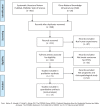The prognostic value and potential drug target of phosphatase and tensin homolog in breast cancer patients: A meta-analysis
- PMID: 28885360
- PMCID: PMC6392695
- DOI: 10.1097/MD.0000000000008000
The prognostic value and potential drug target of phosphatase and tensin homolog in breast cancer patients: A meta-analysis
Abstract
Background: The prognostic significance of phosphatase and tensin homolog (PTEN) in patients with breast cancer (BC) remains controversial. The aims of our meta-analysis are to evaluate its association with clinicopathological characteristics and prognostic value in patients with breast cancer.
Methods: PubMed, EMBASE, Web of Science, and China National Knowledge Infrastructure (CNKI) were systematically searched up to December 2016. The meta-analysis was performed using hazard ratio (HR), odds ratio (OR), and 95% confidence intervals (CI) as effect measures. A fixed or random effect model was used depending on the heterogeneity analysis. Statistical analysis was performed using Review manager software version 5.3.
Results: Seventeen studies including 4343 patients with breast cancer were analyzed. The meta-analysis indicated that breast cancers with PTEN loss were significantly associated with the tumor size ≥2 cm group (ORFEM = 1.68, 95%CIFEM [1.34, 2.10]), negative expression of estrogen receptor (ORREM = 1.95, 95%CIREM [1.09, 3.49]), negative expression of progesterone receptor (ORFEM = 1.72, 95%CIFEM [1.43, 2.08]), the advanced stage (ORREM = 1.94, 95%CIREM [1.35, 2.80]), positive axillary lymph node metastasis (ORREM = 1.80, 95%CIREM [1.30, 2.50]), and the local recurrence (ORFEM = 1.70, 95%CIFEM [1.26, 2.28]). None of other clinicopathological parameters such as the HER2 status and distant metastasis were associated with PTEN loss. The decreased PTEN expression was significantly correlated with the overall survival (OS) of patients (HRREM = 1.83, 95%CIREM [1.32, 2.53]) and the disease-free survival (DFS) of patients (HRREM = 2.43, 95%CIREM [1.31, 4.53]).
Conclusion: Our meta-analysis demonstrates that PTEN loss is of particular importance for predicting breast cancer aggressiveness and poor prognosis. PTEN is a potential drug target for the development of individualized treatment in BC patients.
Conflict of interest statement
The authors have no conflicts of interest to disclose.
Figures




References
-
- Siegel RL, Miller KD, Jemal A. Cancer statistics, 2015. CA Cancer J Clin 2015;65:5–29. - PubMed
-
- Sturgeon CM, Duffy MJ, Stenman UH, et al. National Academy of Clinical Biochemistry laboratory medicine practice guidelines for use of tumor markers in testicular, prostate, colorectal, breast, and ovarian cancers. Clin Chem 2008;54:e11–79. - PubMed
-
- Carnero A, Blanco-Aparicio C, Renner O, et al. The PTEN/PI3K/AKT signalling pathway in cancer, therapeutic implications. Curr Cancer Drug Targets 2008;8:187–98. - PubMed
Publication types
MeSH terms
Substances
LinkOut - more resources
Full Text Sources
Other Literature Sources
Medical
Research Materials
Miscellaneous

